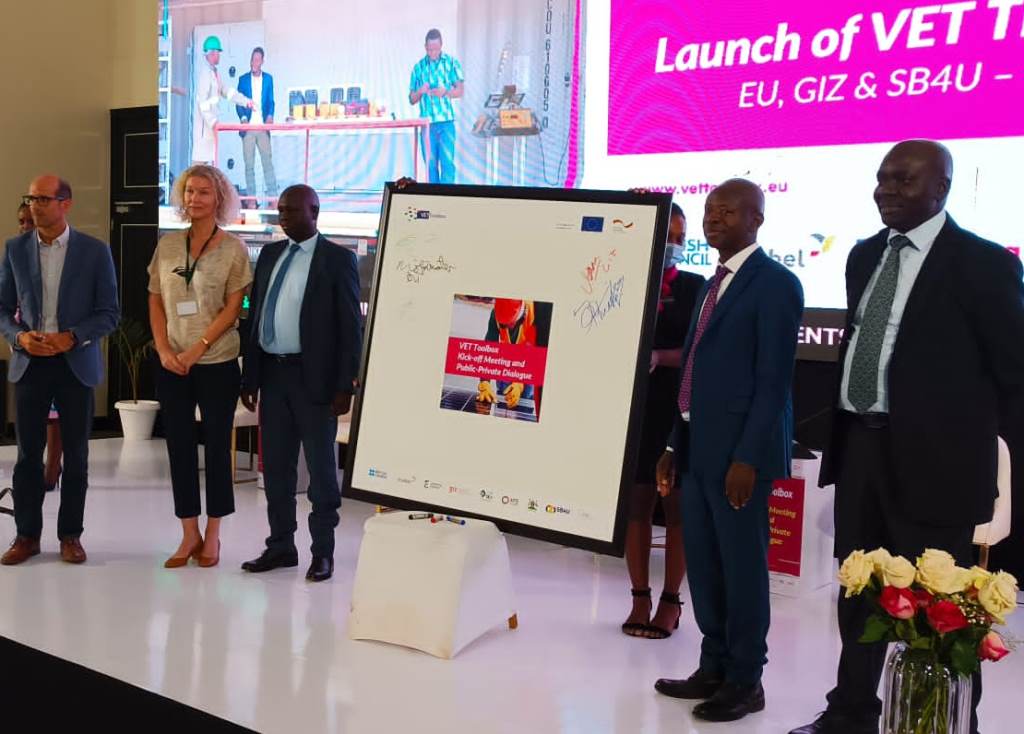As the lights come on in northern Uganda, the EU launches a toolbox to keep them burning

In the expansive plains of northern Uganda, the days can be bright and the nights pitch dark. Recently, the night sky has been getting speckles of brightness as solar mini-grids, sponsored by the German Ministry for Economic Cooperation begin to light up communities in some 25 locations in Lamwo district. Much as residents celebrate the coming of the light however, questions linger.
How sustainable will these investments be if it will take technicians from the big cities to answer to emergency calls by users? The VET Toolbox initiative, launched on June30 in Kampala, is one of the answers. Co-funded by the European Union and the German Federal Ministry of Economic Cooperation and Development (BMZ), the VET Toolbox seeks to equip rural youth with the skills that will create a critical mass of solar-power technicians. These community-based technicians are also important in driving and sustaining the productive use of electricity in areas that are seeing electric power for the first time.
The training goes beyond solar technology. The advent of electricity is opening up new business opportunities, expanding employment options for youth and creating diverse demand for technicians in fields such refrigeration and home appliances.
Being implemented through GIZ’s Employment and Skills for Development in Africa (E4D) programme, the VET Toolbox initiative covers 5 countries in Africa, including Uganda; where rural electrification through solar mini grids has been identified as a key priority sector for the VET Toolbox activities.
According to Donald Agaba GIZ’s E4D (education for Development) Uganda team leader, the project expects to empower 20 trainers of trainers and 100 persons as solar technicians. The skills acquired by the trainees are expected to enable them find gainful employment in the solar sector and offer improved services to local communities. The project also targets 300 beneficiaries to train in the Productive use of Energy.
The regional focus will be on Lamwo district in northern Uganda and Mpigi district, just 30km south of the capital Kampala. This VET Toolbox will complement the ongoing solar powered mini-grids drive with skills development with a focus on tailor-made training that responds to the needs and opportunities of the private sector and beneficiaries.
Focus shall be on supporting the set-up of solar-based mini-grids and solar home kits through skills development efforts, leveraging the creation of access to electricity in rural areas, as well as developing knowledge products on PUE measures.
““Under this project, selected enterprises shall undergo a business diagnostic to identify key constraints limiting their growth and competitiveness, which shall be followed by a series of training and technical assistance in areas of innovation and digitalisation, quality management, market development and access to finance,” ,” said Ms. Caroline Adriaensen, the Head of Cooperation, at the European Union mission to Uganda.
She added that the EU continues to support national economies to expand their share of local value addition and local job creation.
The initiative will also support the development and introduction of practical training modules and curricula for photovoltaic system maintenance and productive use of energy (PuE) at Vocational Training Institutions (VTIs) in northern Uganda. In addition, the capacities of VTI instructors shall be strengthened, enabling them to train technicians on the proper design, installation, and maintenance of solar PV systems and PuE.
“The skills acquired by the trainees shall enable them to find gainful employment in the solar sector and offer improved services to local communities,” Agaba added.
Another component of the project involves working with Sustainable Business for Uganda (SB4U) to establish a platform for engagement between public and private sector actors to discuss topics such as solar and renewable energy.

 African Heads of state head to South Korea next week for Summit talks
African Heads of state head to South Korea next week for Summit talks
 Trading leads as main source of income for Ugandans
Trading leads as main source of income for Ugandans
 New leadership for bankers’ umbrella as total assets top $12 billion
New leadership for bankers’ umbrella as total assets top $12 billion
 Brussels Airlines to announce Nairobi service
Brussels Airlines to announce Nairobi service
 SITA promises enhanced travel experience after Materna acquisition
SITA promises enhanced travel experience after Materna acquisition
 Saudia’s 105 aircraft order stretches A320neo lead over rival Max
Saudia’s 105 aircraft order stretches A320neo lead over rival Max
